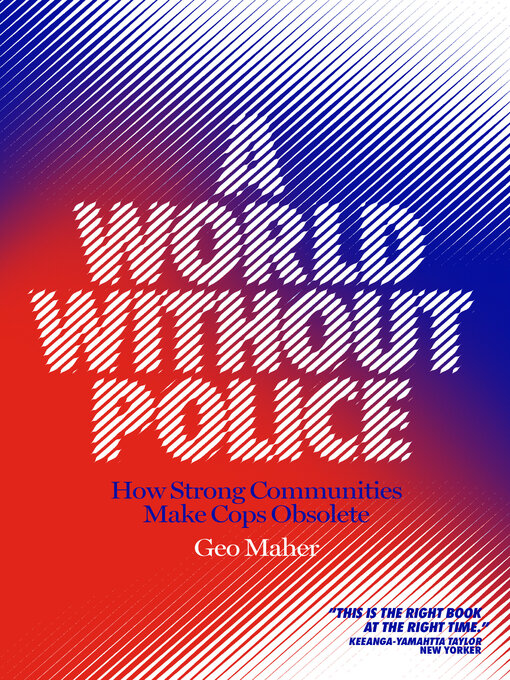Tens of millions of people poured onto the streets for Black Lives Matter, bringing with them a wholly new idea of public safety, common security, and the delivery of justice, communicating that vision in the fiery vernacular of riot, rebellion, and protest. A World Without Police transcribes these new ideas—written in slogans and chants, over occupied bridges and hastily assembled barricades—into a compelling, must-read manifesto for police abolition.
Compellingly argued and lyrically charged, A World Without Police offers concrete strategies for confronting and breaking police power, as a first step toward building community alternatives that make the police obsolete. Surveying the post-protest landscape in Minneapolis, Philadelphia, Chicago, and Oakland, as well as the people who have experimented with policing alternatives at a mass scale in Latin America, Maher details the institutions we can count on to deliver security without the disorganizing interventions of cops: neighborhood response networks, community-based restorative justice practices, democratically organized self-defense projects, and well-resourced social services.
A World Without Police argues that abolition is not a distant dream or an unreachable horizon but an attainable reality. In communities around the world, we are beginning to glimpse a real, lasting justice in which we keep us safe.
-
Creators
-
Publisher
-
Release date
August 24, 2021 -
Formats
-
Kindle Book
-
OverDrive Read
- ISBN: 9781839760075
-
EPUB ebook
- ISBN: 9781839760075
- File size: 816 KB
-
-
Languages
- English
-
Reviews
-
Publisher's Weekly
June 14, 2021
In this provocative and well-researched polemic, political theorist Maher (Decolonizing Dialectics) makes a case for “why we need to abolish the police, and what doing so might look like.” He traces the origins of modern-day law enforcement in the U.S. to slave patrols in the South and strike-breaking in the North, contending that “American policing has always been about two things at once... racist fear and economic profit.” Citing the refusal of an Ohio grand jury to indict police officers for the 2014 shooting death of a Black man who was “holding a BB gun in an open-carry state,” Maher describes how “white fear” and racist media tropes allow the police to evade accountability, and provides evidence that modern policing methods do not significantly reduce or prevent crime. Acknowledging that police abolition “implies a plurality of approaches,” Maher calls for the dissolving of police unions and the creation of “life-affirming” alternatives to policing, such as after-school programs and community-based public safety organizations, and profiles communities in the U.S. and abroad that have taken policing into their own hands. Though some readers will take issue with Maher’s fiery language (“policing is a cancer”), his ample evidence and firm convictions make a persuasive case. This is an essential introduction to the case for abolishing the police. -
Kirkus
June 15, 2021
Is the cry to defund the police mere rhetoric? No way, this book makes clear. Political science professor Maher looks at recent events to deliver a stern shot across the bow. "In the history of the United States," he writes, "nothing has provoked mass rebellion more consistently than police brutality." That brutality, he argues, isn't a bug but a feature built into the essence of policing and a society built around the need for it. Why? Because, he writes, capitalism and its manifold inequalities demand the coercive force that the police represent. Maher extends his argument widely to include forces that control the border, especially the southern border with Mexico, meant to contain the very people who are driven from their homelands as a result of imperial capitalism itself. Meanwhile, as to the police themselves, Maher argues that they are agents of White supremacy--and expensive ones at that. Citing figures from the Urban Institute, he calculates that "state and local spending on the police increased astronomically between 1977 and 2017, from $42 billion to $115 billion. In cities like Chicago, growth was more extreme still: per capita spending on the police nearly tripled from 1964 to 2020." Though not fully taking into account inflation and other similar matters, Maher does make the inarguable point that American police have become increasingly militarized and that, quite clearly, if you're a young male and a member of an ethnic minority, you stand a far greater chance of being jailed or killed by police than if you belong to the privileged majority. The author is quite literal in his call to abolish the police, holding that "the only people police protect and serve are themselves" and that any effort at reform is a futile exercise. Along the way, he adds, it'd be nice to do away with "racial capitalism" as well, an institution that, like the police, has "failed systematically." A thesis sure to stir plenty of controversy but worthy of discussion.COPYRIGHT(2021) Kirkus Reviews, ALL RIGHTS RESERVED.
-
Formats
- Kindle Book
- OverDrive Read
- EPUB ebook
subjects
Languages
- English
Loading
Why is availability limited?
×Availability can change throughout the month based on the library's budget. You can still place a hold on the title, and your hold will be automatically filled as soon as the title is available again.
The Kindle Book format for this title is not supported on:
×Read-along ebook
×The OverDrive Read format of this ebook has professional narration that plays while you read in your browser. Learn more here.


